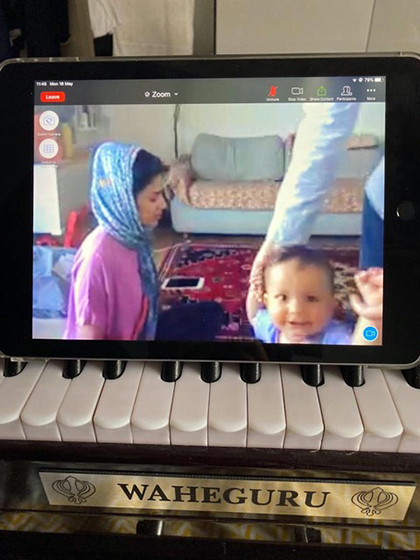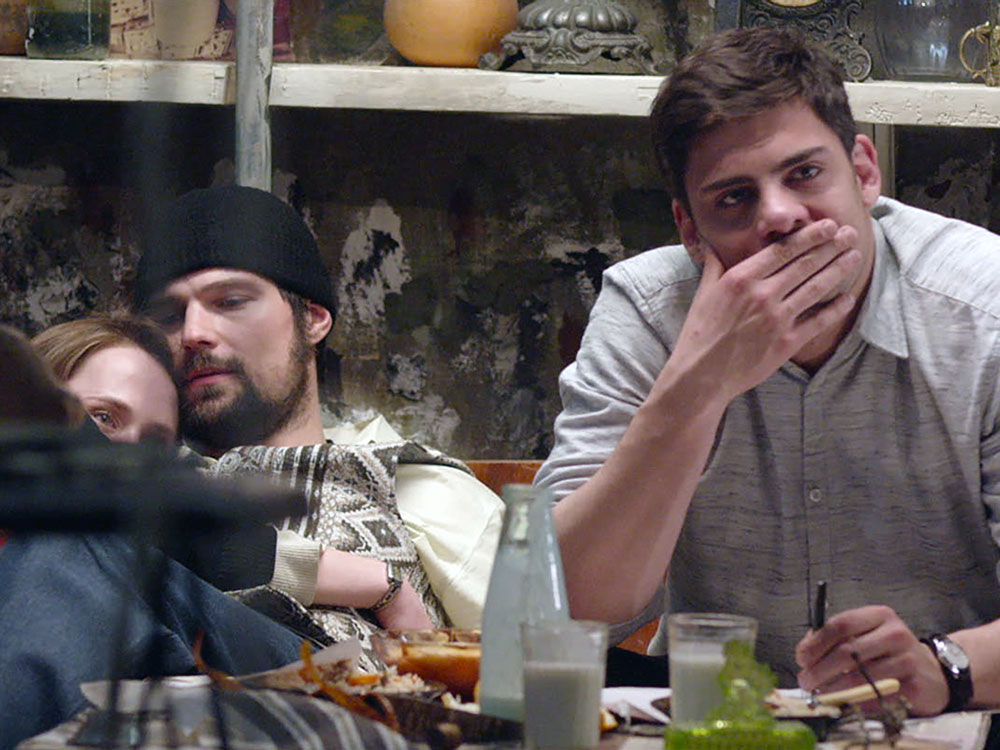The ICA will be on general strike on Fri 20 Oct. Read more
Today’s Daily is guest edited by sound artist and DJ Ain Bailey. I met Ain several years ago at a Black feminist event in London, but first encountered her practice during Congregation, a three-part series of events at the ICA curated by Rosalie Doubal during December 2018 and January 2019. Central to this programme was Ain’s ongoing research into how people use sound to create a sense of place and how communities are formed through the sharing of sound. She further develops this research here through a collection of ‘sonic auto/biographies’ – the personal constellation of sounds that form an individual identity – by inviting friends Christian Nyampeta, Mason Leaver-Yap, Jasleen Kaur, and Gwen Jones to share how they are also thinking about sound right now.
Nydia A. Swaby
I’m an insomniac. The pealing bells of the local church, Holy Trinity, which used to locate me in a secure moment in time, are not well. With the pandemic closing places of worship and suspending maintenance, the soundscape is now perpetually wrong – by one hour. The clock wasn’t adjusted for British Summer Time, and is now causing a temporal disruption. When the bells strike, I’m reminded of the grave era that we currently inhabit. Every hour on the hour.
The last party I attended before the global lockdowns was held at Keleketla! Library in Johannesburg, in February 2020. The occasion was the seventh iteration of People Who Think Together Dance Together, a series of collective DJing parties and sonic gatherings initiated by artist and librarian Rangoato Hlasane as an integral component of the symposiums of Another Roadmap for Arts Education Africa Cluster, a research on the history of arts education undertaken within a network of educators, artists and researchers working in four continents around the world, initiated at the Institute for Art Education at Zurich University of the Arts (ZHdK).
As in my previous experiences of going through great moments of upheaval, the songs I heard at that party and during my stay in Johannesburg have become my current soundtrack. It does help that some of these songs by artists such as Samthing Soweto, Kabza de Small and DJ Maphorisa have spawned a cult following on YouTube, where official and fan-made music videos sit side by side. These videos provide a necessary resource of physical relief from the mandatory sheltering directives in the form of remote dance classes.
In addition to this, I have received and listened to sound recordings from friends and colleagues across the globe, in preparation of the forthcoming season of radio programmes that I organise at Radius, an occasionally active radio station I started running a few years ago.
Some sounds are about what’s missing: the togetherness of birdsong; the recorded roar of Beyoncé’s Coachella crowd; the quietness of the sky; or else the sound of the boundary itself – voices of vulnerable friends who can’t open the door, talking instead through the wood. The banality of this is a shared melancholy.
It’s harder to listen for the sound of pleasure in the present that isn’t reliant on the past. But there’s one that surfaces in almost every connection I’ve had these past weeks: nervous laughter in digital space. It is everywhere: the cackle of friends during a remote Seder as a buck-naked roommate saunters past a cam, full bush; Naomi Klein’s chortle as her child and dog excitedly bust in to join a live YouTube conversation on crisis capitalism; the breathlessness of Vaughan Gething’s Zoom colleagues; Teddy Riley vs Babyface; laughter as I enter a public event with a username I forgot to change from the 24-hour rave the night before (‘thottie+1 has joined the meeting’); the giggle of the Jitsi trainer who’s interval timer for our seemingly endless squats resets every time her impatient sister calls. My glutes still ache.
Nervous laughter erupts when we realise we are not being ‘professional’. It fills the gap between what we want to put into the world and the clunkiness of current reality. It says: Yes, I am exhausted and not confident, but I am trying. I am still laughing.
A Glaswegian sounding ding ding ding turns dang dang dang dang. Eeeeeeeee-yog accompanies solitary exploration of the washing machine. The widest-mouthed aaaaaaah at the wonder of a horse chestnut tree.
As my son nears one revolution around our sun, there is rarely silence in our home. It is the sound of him exploring his voice that brings me the most joy. His near-words are more like song, or a vocal warm up. A composition of different intonations, volumes, rhythms become a 24-hour soundtrack to my day.
As a boy growing up in Delhi, my dad – mischievous, with a complicated life – had a fortuitous encounter with a music teacher who sent him on his musical journey. Years later, growing up in dank Glasgow, he would worship though singing and playing instruments. By age three, his worship became my worship. We’d sing communally in our home, in others’ homes, in homes that became gurdwaras. Voice equated to liberation.
Though at some point I lost it. In The Body Keeps The Score, Bessel van der Kolk talks about how trauma affects the speech centre of the brain. The white spot in the left frontal lobe of the cortex, the Broca’s area, goes offline in a traumatic episode or flashback. So I’ve been trying to relocate it, my voice, through speech and song and listening.
Rai’s voice is uncensored; he sounds like freedom. How do I get back there?
Seven weeks into lockdown and, thanks to a great friend, I was reunited with my record collection, including some of my late dad’s jazz LPs. Historically Speaking by Duke Ellington (London Records, 1956) beat a path through piles of hardcore punk to claim first place on the turntable and remained there for hours. The opening track, East Street Toodle-Oo, is the oldest, dating from 1926 and performed here with the original orchestration, while other numbers feature new arrangements and additions. The ensemble playing and solos are just sublime. My dad died ten years ago very suddenly and too young; the muted trombone and clarinets on ‘Creole Love Call’ collapsed all that unbridgeable distance. Can we separate what we feel from what we know about music, and would we even want to? It’s doubtful. Tracks like ‘Jack the Bear’ and ‘Ko-Ko’ sound like the thrill of early rail travel, pushing forward through blazing rhythms at a time when Ellington hired private train cars for his orchestra on tours through the segregated South. Right now, our lives are saturated with a heightened awareness of mortality. This heavy slice of vinyl merges genius, joy and grief: Time travel for indistinct days, historically speaking.
Together we can do more! Please consider supporting our work by subscribing to ICA Red Membership today
To receive the ICA Daily email, sign up here
The ICA is a charity. If you would like to support us during this difficult time, you can make a donation here

Communal singing during lockdown. Photo: Simran Kaur, 2020.











no. 236848.